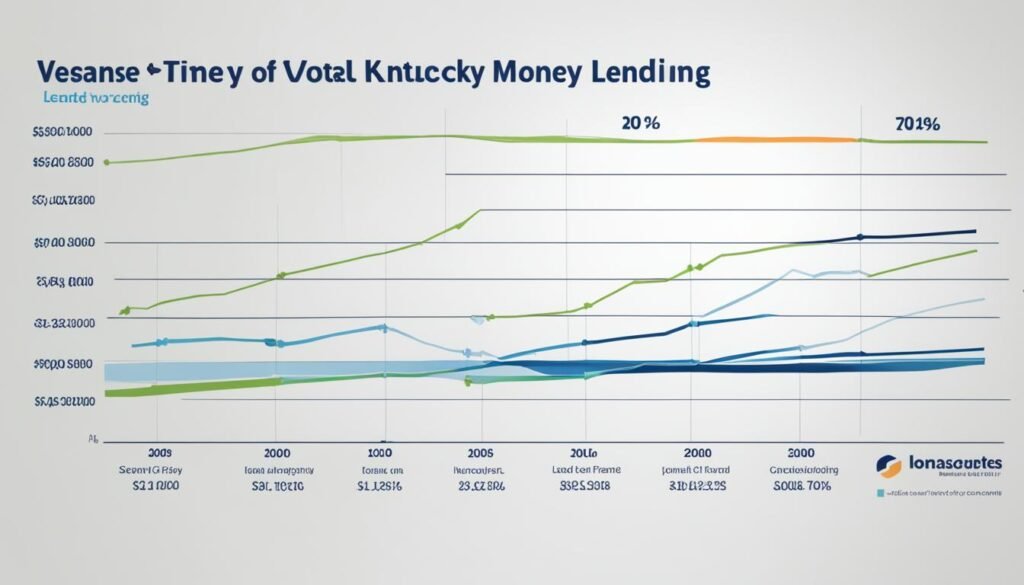Are you in the process of buying a new home but need quick financing? A mortgage bridge loan could be the solution you’re looking for. Whether you’re purchasing a new home or need funds to pay off debt, a bridge loan provides cash flow during a transitional period. With its short-term nature, usually lasting 6 months to 1 year, a bridge loan can help you bridge the financial gap and make your move seamless.
When it comes to financing options for a new home, a mortgage bridge loan offers flexibility and convenience. While it’s important to understand that a bridge loan is not designed to replace long-term financing, it can serve as a valuable tool during the transition process. Whether you’re looking to secure a down payment before selling your current home or need financing when the closing dates don’t align, a bridge loan can provide the quick access to capital you need.
However, it’s essential to consider the pros and cons before opting for a bridge loan. Bridge loans typically come with higher interest rates compared to traditional mortgages. On the positive side, they provide an opportunity to make a contingency-free offer on a new home and access additional funds during a transitional period. But on the flip side, managing two mortgages simultaneously and the risk of foreclosure if the sale of your current home falls through are factors to consider.
As you explore your financing options for a new home, it’s important to carefully evaluate the requirements of a bridge loan. Lenders will consider factors such as your credit score, credit history, debt-to-income ratio, and loan-to-value ratio. By understanding these requirements and shopping around for the best loan terms and rates, you can make an informed decision that suits your financial needs.
In conclusion, a mortgage bridge loan can be a valuable tool on your path to a new home. It offers the flexibility, convenience, and quick financing you need during a transitional period. However, it’s crucial to understand the risks and benefits, as well as explore alternative financing options such as home equity loans, HELOCs, 80-10-10 loans, or personal loans. By carefully considering your options, you can find the financing solution that best suits your circumstances and helps you achieve your homeownership goals.
What is a Bridge Loan and How Does It Work?
A bridge loan is a financing option that serves as a source of funding until permanent financing is obtained or debt is paid off. It provides a short-term solution for individuals or businesses in need of quick capital. Bridge loans are commonly used in real estate transactions to bridge the gap between buying and selling a property.
One of the key features of a bridge loan is that it can be secured using the borrower’s current home as collateral. This means that borrowers can use the equity in their existing property to secure the loan and finance the purchase of a new home before selling their current one. This can be especially helpful when there is a time gap between the purchase of a new home and the sale of the existing one.
The terms and conditions of bridge loans can vary depending on the lender and the specific circumstances. However, bridge loans typically have higher interest rates than traditional mortgages. This is because they are designed to be short-term loans that provide quick access to capital. Bridge loans are often repaid within a period of 6 months to 1 year.
Overall, a bridge loan can be an effective financing option for individuals or businesses in need of short-term funding. Whether it’s to facilitate a real estate transaction or to cover unexpected expenses, a bridge loan can provide the necessary funds until long-term financing or debt repayment is secured.
In the next section, we will explore the various situations in which a bridge loan can be useful and when it might be the right financing option to consider.
When to Use a Bridge Loan
Bridge loans can be a valuable financing option in various situations, providing homeowners with the flexibility and convenience they need during transitional periods. Here are some scenarios where a bridge loan could be the right choice:
- Down payment for a new home: If you’re looking to buy a new home before selling your current one, a bridge loan can provide the necessary funds for the down payment, allowing you to secure the property without waiting for the sale.
- Career transition that requires a quick move: If you’re changing jobs or relocating for work and need to move quickly, a bridge loan can help cover the costs of purchasing a new home while waiting for your current home to sell.
- Closing dates misalignment: Sometimes, the closing dates for buying and selling homes don’t align perfectly, leaving homeowners in need of temporary financing. A bridge loan can bridge this gap, ensuring a smooth transition between properties.
- Securing a new property before listing the current one: In competitive real estate markets, securing a desirable property before listing your current one can increase your chances of a successful purchase. A bridge loan can provide the necessary funds to make this happen.
- Sellers not accepting contingency offers: In some cases, sellers in high-demand areas may not accept contingent purchase offers. A bridge loan can allow you to make a strong non-contingent offer, increasing your chances of securing your dream home.
When faced with these situations, a bridge loan can offer a practical solution to bridge the financial gap and facilitate a smooth transition to your new home.
Bridge Loan Requirements
When applying for a bridge loan, there are certain requirements that lenders consider to assess your eligibility. These requirements include:
- Credit Score: Lenders will review your credit score to evaluate your creditworthiness and determine the level of risk involved in lending to you. A higher credit score increases your chances of qualifying for a bridge loan.
- Credit History: Your credit history provides insight into your past financial behavior, such as your payment history, outstanding debts, and any delinquencies. Lenders will analyze your credit history to assess your ability to manage debt responsibly.
- Debt-to-Income Ratio (DTI): The debt-to-income ratio is a measure of your monthly debt obligations compared to your monthly income. Lenders consider this ratio to determine if you have enough income to cover both the bridge loan payments and your existing financial commitments.
- Loan-to-Value Ratio (LTV): The loan-to-value ratio represents the percentage of the current home’s value that the bridge loan will cover. Most lenders allow borrowers to borrow up to 80% of the loan-to-value ratio, but this may vary depending on individual lender requirements.
- Additional Financial Qualifications: In addition to the above requirements, some lenders may have additional financial qualifications, such as minimum credit scores or a required amount of home equity, that borrowers must meet to be eligible for a bridge loan.
Meeting these requirements is crucial for obtaining a bridge loan and securing the necessary financing during your transitional period. It is recommended to consult with multiple lenders to compare their specific requirements and determine the best fit for your financial situation.
Pros and Cons of Bridge Loans
Bridge loans offer several advantages and disadvantages that homeowners should consider before opting for this financing option.
Advantages of Bridge Loans
- Contingency-Free Offer: Bridge loans allow homeowners to make a contingency-free offer on a new home, giving them a competitive edge in a competitive real estate market.
- Access to Additional Funds: During a transitional period, bridge loans provide homeowners with access to additional funds, ensuring cash flow is maintained for various expenses.
- Deferred or Interest-Only Payments: Some bridge loan arrangements offer the flexibility of deferred or interest-only payments, allowing homeowners to manage their finances more effectively during the transition.
Disadvantages of Bridge Loans
- Higher Interest Rates: Bridge loans typically come with higher interest rates than traditional mortgages, which can increase the overall cost of the loan.
- Home Equity Requirement: Lenders often require substantial home equity as collateral for bridge loans, limiting eligibility for borrowers with limited equity.
- Two Mortgages at Once: Managing two mortgages simultaneously can be challenging, particularly when coordinating payments and keeping track of financial obligations.
- Risk of Foreclosure: If the sale of the current home falls through, homeowners with bridge loans may face the risk of foreclosure if they are unable to repay the loan.
When considering a bridge loan, homeowners should weigh these advantages and disadvantages to determine if it aligns with their financial goals and circumstances.
- Section 6: Tips on Choosing a Bridge Loan
- Section 7: Bridge Loan Alternatives
- Section 8: Bridge Loan Rates and Costs
- Section 9: What You Need to Know About Bridge Loans
- Section 10: Conclusion
Tips on Choosing a Bridge Loan
When shopping for a bridge loan, it is crucial to make an informed decision. Here are some essential tips to keep in mind:
1. Compare Offers
Don’t settle for the first bridge loan offer you receive. Take the time to compare offers from different lenders. Look for competitive interest rates, favorable terms, and flexible repayment options. By exploring multiple options, you can secure the best deal.
2. Beware of Excessive Rates
While quick access to capital is crucial, be cautious of lenders offering high-interest rates that can strain your finances. Ensure the interest rates offered are reasonable and align with market standards. Don’t hesitate to negotiate with the lender to find a suitable rate.
3. Choose a Reputable Lender
Opt for a lender with a proven track record of strong performance and customer service. Research their reputation, read customer reviews, and seek recommendations from trusted sources. A reliable lender will provide transparent information, guide you through the process, and address any concerns you may have.
4. Consider Interest Rates and Fees
Pay close attention to the interest rates and fees associated with the bridge loan. While bridge loans generally have higher interest rates, ensure that they are reasonable and competitive. Additionally, carefully review any fees, such as origination fees or closing costs, to understand the total cost of the loan.
5. Evaluate Requirements and Qualifications
Each lender may have different requirements and qualifications for bridge loans. Consider factors such as credit score, income stability, and home equity requirements. Ensure that you meet the lender’s criteria and understand any potential limitations.
By following these tips, you can navigate the process of choosing a bridge loan effectively. Remember, thorough research and careful consideration are key to finding the right loan for your needs.
Bridge Loan Alternatives
If a bridge loan is not the right option for your needs, there are several alternatives to consider. These alternatives offer different financing options that may suit your specific situation:
- Home equity loans: Borrow against the equity in your home to obtain funds for your new home purchase or other needs.
- Home equity lines of credit (HELOC): Functioning as a second mortgage, a HELOC offers lower interest rates and allows you to borrow against your home’s equity as needed.
- 80-10-10 loans: This type of loan structure involves taking out two mortgages simultaneously to avoid mortgage insurance and lower the down payment requirement.
- Personal loans: Depending on your credit history and financial qualifications, you may be able to secure a personal loan to finance your new home or cover other expenses. Personal loans can be either secured or unsecured.
It’s important to carefully evaluate these alternatives and consider their pros and cons in comparison to bridge loans. Each option has its own requirements and terms, so be sure to research and understand the specific details and qualifications before making a decision.

Bridge Loan Rates and Costs
When considering a bridge loan, it’s essential to understand the rates and costs associated with this type of financing. Unlike traditional mortgages, bridge loans generally come with higher interest rates. Typically, these rates range from the prime rate to slightly above it. It’s crucial to weigh this factor carefully when deciding on a bridge loan.
In addition to interest rates, bridge loans also incur various costs. Closing costs are one such expense that borrowers should be prepared for. These costs typically include fees for processing the loan, title searches, and other necessary legal paperwork. Origination fees are also common with bridge loans, and they cover the administrative expenses incurred by the lender in processing the loan.
Furthermore, borrowers may be subject to appraisal fees when obtaining a bridge loan. These fees cover the cost of an appraisal to determine the value of the property being used as collateral. It’s vital for borrowers to carefully review the terms and conditions of any bridge loan offer to ascertain the specific costs involved.
To illustrate the potential costs, let’s consider an example:
- Bridge Loan Amount: $200,000
- Interest Rate: Prime Rate + 2%
- Closing Costs: $3,000
- Origination Fees: 1% of Loan Amount
- Appraisal Fees: $500
In this scenario, the interest rate applied to the bridge loan would be determined by adding 2% to the current prime rate. In addition, the borrower would need to budget for closing costs totaling $3,000, plus an origination fee equivalent to 1% of the loan amount ($2,000). The appraisal fee would amount to $500.
By carefully evaluating the rates and costs associated with bridge loans, borrowers can make informed decisions about their financing options. It’s advisable to compare multiple loan offers from different lenders and consider their interest rates, closing costs, origination fees, and appraisal fees. This way, borrowers can select the most favorable bridge loan offer that aligns with their financial needs and goals.
What You Need to Know About Bridge Loans
Bridge loans provide a short-term financing solution for homeowners who are transitioning from one home to another. These loans serve as a bridge to help manage the gap between buying and selling a home, providing the necessary cash flow during this transitional period.
One of the key features of bridge loans is the ability to secure them using the current property as collateral. This collateral helps lenders mitigate the financial risks associated with these loans. However, it’s important to note that lenders have specific requirements, which may include credit score, equity, and financial qualifications.
While bridge loans offer an effective financial solution, they also come with certain risks. One of the major risks is the higher interest rates compared to traditional mortgages. It’s essential to carefully consider the terms and conditions of the loan, ensuring that it aligns with your financial goals and capabilities.
Additionally, in the event that the sale of your current home falls through, there is a risk of foreclosure. It’s crucial to factor in this possibility and have contingency plans in place to mitigate this risk.
Before opting for a bridge loan, thoroughly assess your financial situation and understand the lender’s requirements. Evaluate the financial risks and benefits to make an informed decision. This will help ensure that a bridge loan is the right financing option for your specific needs.
For a visual representation of how bridge loans work, refer to the image below:

Conclusion
In conclusion, a mortgage bridge loan can be a valuable financing option for homeowners in transition. Whether you need quick financing for a new home or want to pay off debt, a bridge loan can provide the necessary cash flow during this transitional period.
However, it is essential to carefully weigh the pros and cons before choosing a bridge loan. Consider the lender requirements, such as credit score and equity, and evaluate the interest rates and associated costs. Bridge loans typically come with higher interest rates than traditional mortgages.
Additionally, keep in mind that there are alternative financing options available. Home equity loans, HELOCs, 80-10-10 loans, and personal loans can be viable alternatives depending on your individual circumstances. It is crucial to assess all available financing options and select the one that best fits your needs.
Before making a decision, consider all the considerations involved in a mortgage bridge loan. Careful evaluation of the pros and cons, lender requirements, interest rates, costs, and alternative financing options is key to making an informed choice that aligns with your financial goals.
FAQ
What is a mortgage bridge loan?
A mortgage bridge loan is a financing option that provides cash flow during a transitional period, such as moving from one home to another.
How does a bridge loan work?
A bridge loan serves as a source of funding until permanent financing is obtained or debt is paid off. It is often used in real estate transactions to bridge the gap between buying and selling a home.
When should I use a bridge loan?
Bridge loans can be useful in various situations, including when a homeowner needs a down payment for a new home before selling their current one, during a career transition that requires a quick move, or when the closing dates for buying and selling homes don’t align.
What are the requirements for a bridge loan?
When applying for a bridge loan, lenders typically consider factors such as the borrower’s credit score, credit history, debt-to-income ratio, and loan-to-value ratio. Some lenders may have minimum credit score requirements and require a certain amount of home equity.
What are the pros and cons of bridge loans?
Bridge loans offer advantages such as the ability to make a contingency-free offer on a new home and access to additional funds during a transitionary period. However, they also have disadvantages such as higher interest rates, the need to manage two mortgages at once, and the risk of foreclosure if the sale of the current home falls through.
What tips should I follow when choosing a bridge loan?
When shopping for a bridge loan, it is important to compare offers from different lenders, choose a lender with a track record of strong performance and customer service, and carefully consider interest rates and fees associated with the loan.
What are the alternatives to bridge loans?
If a bridge loan is not the right option, alternatives to consider include home equity loans, home equity lines of credit (HELOC), 80-10-10 loans, and personal loans.
What are the rates and costs of bridge loans?
Bridge loans tend to have higher interest rates than traditional mortgages and incur closing costs, origination fees, and other lender-specific charges. It is important to carefully review the terms and conditions of any bridge loan offer to understand the costs involved.
What do I need to know about bridge loans?
Bridge loans are short-term loans used to bridge the gap between buying and selling a home. They can be secured using the borrower’s current home as collateral and are subject to lender requirements such as credit score, equity, and financial qualifications.
What should I consider when thinking about a mortgage bridge loan?
When considering a mortgage bridge loan, it is important to carefully weigh the pros and cons, lender requirements, interest rates, and associated costs. It is also worth considering alternative financing options depending on individual circumstances.


























































